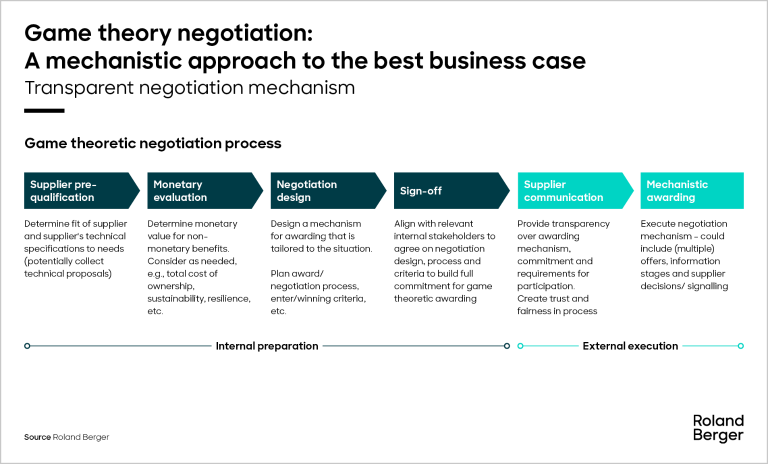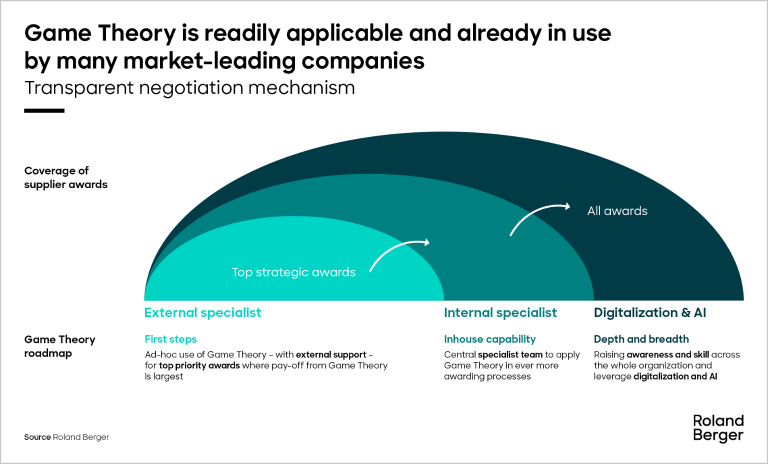How industry leaders leverage AI to boost next generation manufacturing & operations.


How game theory can boost procurement performance
By Pieter Niehues and Maxim Przystaw
Gaining a strategic advantage in negotiations and decision making
Game theory, a Nobel Prize-winning framework, is reshaping procurement by offering structured approaches to negotiations, supplier selection, and contract design. By applying game-theoretic mechanisms, organizations can significantly reduce costs, improve overall efficiency, and maximize compliance. From auctions to bilateral negotiations, game theory empowers procurement teams to make informed and objectified decisions that boost value.

"A key use of game theory in procurement is designing supplier interactions to secure the best prices and fair contract awards through competition."
Once an academic concept, game theory is now a practical methodology for procurement teams. It enables buyers to analyze interactions between parties, anticipate responses to incentives, and design competitive mechanisms for negotiations. A key use of game theory in procurement is designing supplier interactions to secure the best prices and fair contract awards through competition. It also plays a crucial role in aligning contract incentives to prevent unintended consequences and ensure long-term supplier commitment. Furthermore, game theory can provide a framework for transparent and efficient cross-functional collaboration.
Unlocking value: Applying game theory in awarding processes
The most immediate use of game theory in procurement is in competitive awarding processes such as auctions and negotiations. A well-structured approach provides significant benefits, including cost savings through competitive mechanisms that can generate more than 10 percent additional savings compared to traditional negotiations, making it a highly effective strategy for cost reduction. Clear award mechanisms and selection criteria ensure fair treatment of suppliers and reduce disputes, while a structured process improves cross-functional acceptance and joint decision-making.
To successfully apply game theory in supplier negotiations, organizations should ensure all participating suppliers are fully qualified to fulfill their needs. Conducting total-cost-of-ownership assessments, including all relevant product and service quality criteria, allows for effective supplier comparisons. Clearly defining selection procedures and award mandates helps prevent ambiguity. Transparent alignment on negotiation mechanisms with all stakeholders is also essential to facilitate a fair and efficient process.
Ultimately, a strong commitment to the process as well as clear communication of award mechanisms and rules of the game to suppliers are crucial to the success of game theory approaches. In a game-theoretic awarding process, procurement professionals should:
- Qualify suppliers and ensure comparability between their offers on a technical level
- Perform total-cost-of-ownership assessments to ensure comparability between suppliers and offered products as well as services
- Define a clear scope and obtain a sourcing mandate to award the business
- Define mechanistic rules for selecting the winning supplier(s)
- Obtain commitment from internal stakeholders to support the process and its awarding mechanism
- Communicate rules and incentives to suppliers and ensure their understanding and participation, for example by conducting a test run with qualified suppliers
- Execute the mechanism and award the contract, either face-to-face or via a suitable digital tool
Beyond auctions: Expanding game theory’s applications
While auctions and competitive negotiations are the most common applications, game theory also extends into other areas of procurement. In monopolistic settings, tools such as payoff matrices and game trees help predict supplier strategies during bilateral negotiations. Contract design can benefit from game theory by ensuring the right incentives are in place to prevent disputes and unintended risks. Since procurement processes require cross-functional collaboration, game theory can also improve decision-making by optimizing the flow of information and allocation of resources.
Building in-house Game Theory expertise
Many leading companies are integrating game theory into their procurement strategies via a three-stage approach. Initially, organizations engage external specialists for high-value negotiations to test the effectiveness of game theory. Once its value is proven, they form a dedicated game theory team to apply strategic frameworks across procurement. This involves training both procurement and cross-functional teams in game theory principles to build broad organizational capability. Finally, companies are using AI and digital tools to extend and systematize the application of game theory to a broader range of procurement decisions, making it a key way to sustainably leverage competition in supplier awards.
Applied properly, game theory is a practical and powerful ally for procurement functions. By structuring negotiations, aligning incentives, and fostering transparency, it enables companies to achieve cost savings and strategic advantages. As digitalization continues to advance, game theory will become even more accessible, allowing procurement professionals to make smarter, more effective decisions in an increasingly complex market.








